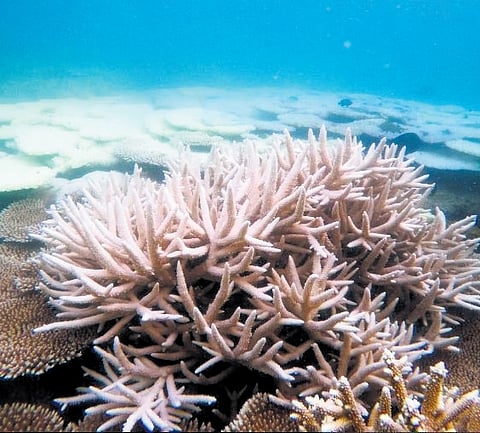

KOTTAYAM: Alarm bells are ringing in Lakshadweep as the coral reefs there are showing worrying signs of mass bleaching (coral mortality). The phenomenon, a clear indication of severe heat stress on coral communities, poses a significant threat to the delicate underwater ecosystem, especially in shallow reefs and lagoons.
The phenomenon is being reported at a time when National Oceanic and Atmospheric Administration (NOAA) of the US has confirmed a global bleaching event occurring across the tropics. Just recently, coral reefs in the biodiversity-rich Gulf of Mannar Marine Biosphere Reserve had started showing early signs of mass bleaching, prompting the Tamil Nadu forest department to order rapid underwater surveys to assess the situation.
As per reports, the mass bleaching has been triggered by several months of elevated global sea surface temperatures (SSTs) resulting from prolonged El Niño conditions throughout much of 2023. This marks the fourth such event to be declared after the late 1990s, highlighting the escalating impacts of climate change on ecosystems across the world.
With shallow water temperatures exceeding seasonal averages by 1.6°C, researchers in Lakshadweep are observing widespread signs of coral stress. Many species are turning pale or white, experiencing coral tissue wasting, and ultimately perishing.
Researchers explain that bleaching occurs when the symbiotic relationship between the corals and their photosynthetic algal partners deteriorates under stressful conditions; primarily high temperatures.
The expulsion of the algal associate from the coral tissue results in the characteristic whitening or ‘bleaching’ that signifies stress. This leads to corals losing their primary source of nutrition, and if stress persists, they eventually starve and perish. The phenomenon is often linked to El Niño years, characterised by above-average temperatures in India and a weakening of Indian summer monsoons.
While coral bleaching has been reported in the Great Barrier Reef in Australia, reefs in India are exhibiting similar distressing trends. The reefs of Lakshadweep were significantly impacted by global bleaching events in 1998, 2010, and 2016. Researchers from the Nature Conservation Foundation (NCF) noted a 25% decline in coral cover since the first global bleaching event.
Mayukh Dey, a researcher at NCF, compares losing coral reefs to losing trees in a rainforest. Though the reefs can recover in patches over time, he says, NCF’s research indicates it takes at least six to seven years without further disturbances for noticeable recovery to occur.
Radhika Nair, another NCF researcher, says these impacts can be long-lasting, with species dependent on corals potentially unable to recover even if certain kinds of coral do. “The loss of habitat has a cascading impact on the invertebrates and fish rely on this structure,” she adds.
Wenzel Pinto, an NCF researcher working on reef health, expresses concern about the future of reefs in Lakshadweep if current temperature trends persist, emphasising the need for urgent action to mitigate further damage by climate change.
Heat stress
The mass bleaching phenomenon is a clear indication of severe heat stress on coral communities
Many species are turning pale or white, experiencing coral tissue loss, and ultimately perishing
Experts compare losing coral reefs to losing trees in a rainforest